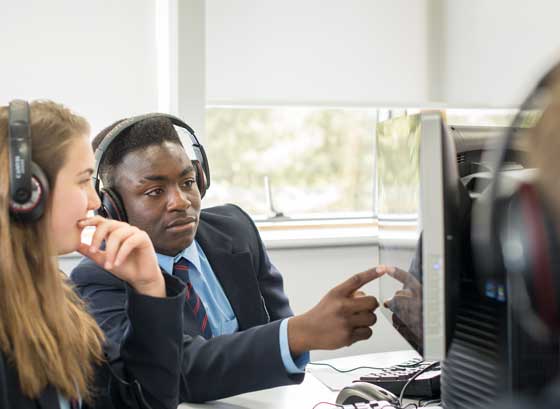
The Nobel Linguist…
Learns through interaction with others;
Imagines, creates and plays with language;
Never worries about mistakes; is confident and takes risks;
Gets pleasure from using language; enthuses about it;
Uses every opportunity to express new ideas; is
Internationally aware and explores other cultures;
Shows passion and curiosity for languages and is…
Tenacious.
Course Aims
At Nobel, the study of modern foreign languages is based on a robust curriculum that leads to the effective development of the four skills (listening, reading, speaking & writing), holistic learning as well as intercultural awareness and communication. Students are provided with a range of opportunities to:
- Develop their curiosity and understanding of the world.
- Learn and progressively master the vocabulary and the grammar specified in their content of study.
- Increasingly develop the ability to speak spontaneously, fluently and confidently in situations of real communication.
- Develop the ability to write at varying lengths for different purposes, progressively improving the accuracy of their spelling and that of the grammatical structures they use.
- Acquire translation skills needed for their exams and future jobs as well as a variety of other skills that will enable them to develop as linguists and become proficient users of the languages they study.
- Foster their desire to read literary texts, listen or view authentic material in order to develop their linguistic repertoire and for their own enjoyment.
General Course Content
Year 7
Students start in Year 7 with one of French, German or Spanish. Half of the year group study one of these languages while the other half study another. If there is any reason a student should learn a specific language (e.g. family members who speak the language or live in a country where the language is spoken) then this should be communicated to the school before students start in Year 7. We will do our best to accommodate the request, if it is possible.
Students are given appropriate transition provision at the beginning of Year 7 in order to aid their induction into secondary school. In Year 7 students start to study topic areas such as: Me, my family and friends, free time activities (cinema, music, sports), and food and drink. These modules will be revisited and extended in year 9.
Alongside these modules, students in Year 7 are expected to expand their knowledge of language and culture by reading texts from the department’s library or online, listening to music or a podcast, watching a film or series, and completing supercurricular activities.
Year 8
All students will continue with the language they studied in Year 7 to build their knowledge and confidence of vocabulary and grammar. Most students are in mixed ability classes in Year 8, with the exception of a top set and nurture group for each language.
In Year 8 students start to study topic areas such as: Home, town, neighbourhood and region, Travel and tourism, My studies and Life at school/college. These modules will be revisited and extended in year 10.
Alongside these modules, students in Year 8 are expected to expand their knowledge of language and culture by reading texts from the department’s library or online, listening to music or a podcast, watching a film or series, and completing supercurricular activities.
Year 9
All students will continue with the language they studied in Year 8 to build their knowledge and confidence of vocabulary and grammar. Most students are in mixed ability classes in Year 9, with the exception of a top set and nurture group for each language.
In Year 9 students revisit and extend topic areas such as: Me, my family and friends, free time activities (cinema, music, sports), and food and drink. They will also study the new topic of marriage.
Alongside these modules, students in Year 9 are expected to expand their knowledge of language and culture by reading texts from the department’s library or online, listening to music or a podcast, watching a film or series, and completing supercurricular activities.
Curriculum Plans
Click the links below to view PDFs

